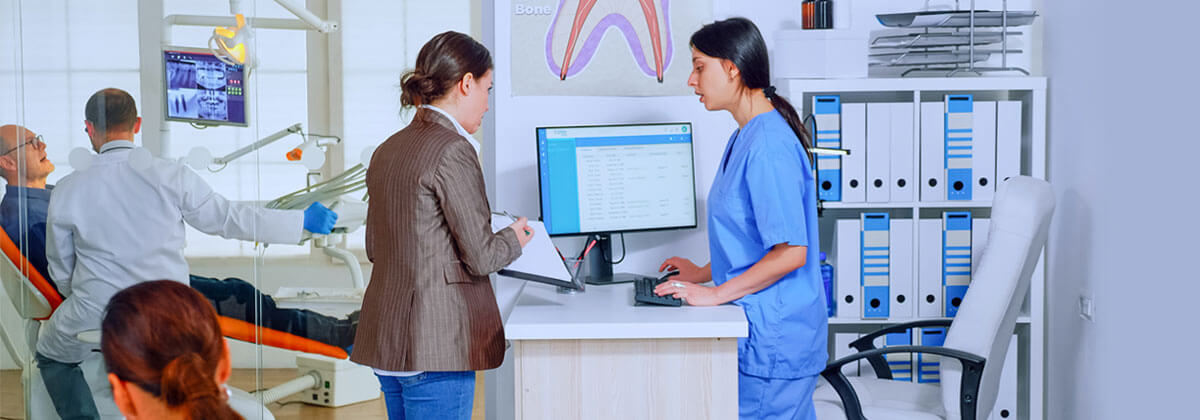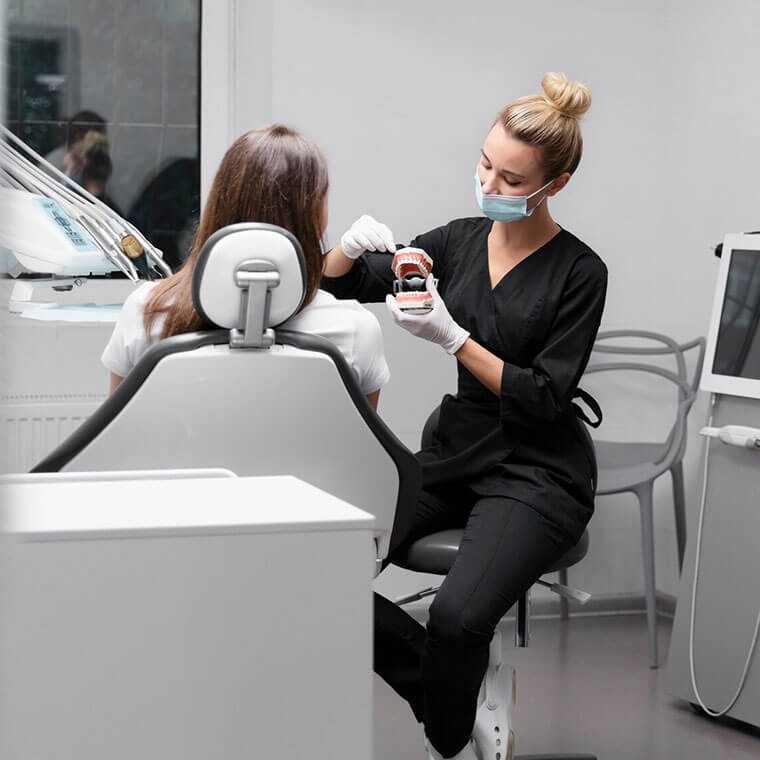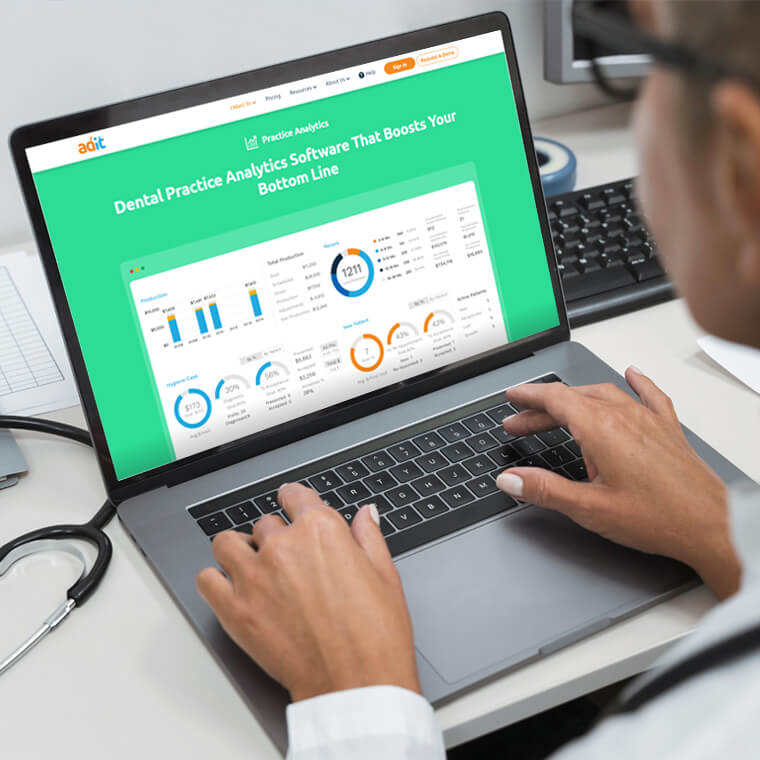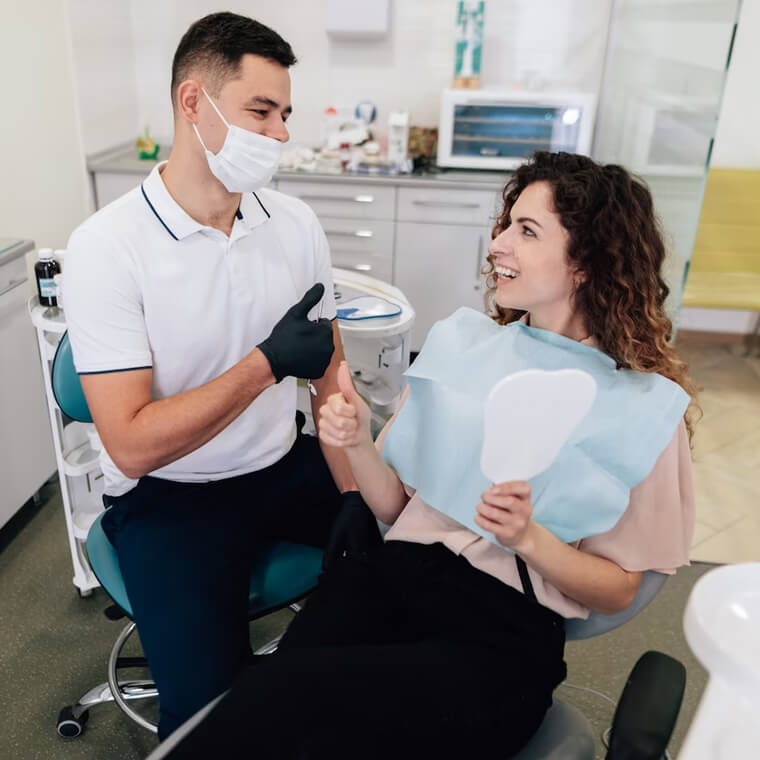Top Essentials for Effective Task Delegation in the Dental Office

In the bustling environment of a dental office, efficient task delegation is crucial for ensuring smooth operations, excellent patient care, and a thriving practice. The challenges faced in the dental profession, ranging from patient care to administrative tasks, demand a strategic approach to delegation. Explore this deep dive into effective task delegation in your practice, offering insights into overcoming common challenges and optimizing productivity.
Dental Delegation Dilemmas
Delegating tasks in a dental office, though essential, comes with its own set of challenges. Addressing these challenges proactively is vital for ensuring efficient operations and maintaining a harmonious work environment.
Here are some of the most common delegation challenges faced by dental offices:
Skill Discrepancies

Dental offices often consist of team members with varying skill levels. Delegating tasks becomes challenging due to these discrepancies. It's common to have both seasoned professionals and newer staff, each with different competencies. This diversity can lead to difficulties in assigning tasks effectively and ensuring they are completed to the desired standard.
Time Constraints
The dental environment is known for its fast-paced nature. There's little room for elaborate delegation processes. Dentists and their teams are often pressed for time, dealing with back-to-back appointments and various procedures throughout the day. Finding the time to delegate tasks comprehensively, and ensuring each team member understands their responsibilities, can be a significant challenge.
Fear of Micromanagement
Dentists and team leaders might hesitate to delegate tasks due to a fear of micromanagement. They worry that if they delegate tasks, they might end up overly controlling the process, diminishing the autonomy of their team members. This fear can hinder effective delegation, impacting the overall efficiency of the dental practice.
Effective Communication Barriers
Clear communication is crucial in any workplace. In a dental office, miscommunication can lead to errors in patient care, administrative tasks, or appointment scheduling. Effective delegation requires precise communication about the task, its requirements, and the expected outcomes. Communication barriers, whether due to hierarchical structures or language differences, can impede this essential process.
Resistance to Change
Implementing new delegation strategies often faces resistance, especially from long-term staff members accustomed to existing routines. These individuals might be hesitant to adopt new methods or technologies, leading to a lack of synergy in task delegation. Overcoming this resistance and encouraging a smooth transition to new processes can be a significant challenge.
Lack of Accountability
Without clear accountability measures, tasks can easily slip through the cracks. When there's no designated person responsible for a task, it might remain incomplete, impacting the overall workflow. Establishing accountability within the team is essential but can be difficult, especially if there's a lack of clarity regarding individual responsibilities.
Balancing Delegated and Direct Responsibilities
Dental professionals often find themselves juggling between tasks they delegate and those they handle directly. Balancing these responsibilities is essential for maintaining a smooth workflow. However, finding the right equilibrium, where delegated tasks are efficiently managed while direct responsibilities are not compromised, poses a considerable challenge.
Addressing these issues requires a nuanced understanding of the dental practice's dynamics and a strategic approach to task delegation. Each challenge presents its unique complexities, demanding tailored solutions to ensure efficient operations within the dental office.
How to Overcome Delegation Challenges
Now that we’ve explored the hurdles, let’s delve into effective strategies. Overcoming these challenges not only streamlines dental office operations but also ensures the delivery of exceptional patient care. Let’s explore eight solutions that can transform delegation from a challenge into a cornerstone of productivity and success in any dental practice.
This Utah practice reduced no-shows by 80% and saved 3 hours daily with Adit Are you still doing things manually in your dental practice? One Utah-based dental practice was overwhelmed by missed appointments, time-intensive forms, and inconsistent...
Download Case Study1. Strategic Task Assessment

In dental practice management, strategic task assessment emerges as a choreographer, orchestrating a harmonious dance of skills, strengths, and expertise. Here’s how this meticulous process, can transform task delegation into an art form instead of a hassle:
Understanding Team Expertise: Dental office staff consists of a mosaic of unique skills and capabilities. From the seasoned dentist with years of experience to the skilled dental hygienist proficient in patient education, recognizing these strengths is pivotal to creating a dream team for your office.
Before delegating tasks, delve into your team’s expertise. Understand the specific procedures they excel at, the areas where they require support, and the nuances of their individual strengths. For instance, a dental assistant might have exceptional organizational skills, making them ideal for managing inventory and supplies within the clinic.
Skill Profiling: Dentistry is officially in a digital age, and the power of data-driven decision-making is unparalleled. Modern practice management solutions offer sophisticated skill profiling tools. These tools allow you to comprehensively assess productivity and leverage your team’s expertise. Create detailed profiles for each team member, highlighting their qualifications, certifications, and areas of specialization.
For example, if a dental hygienist has received additional training in pediatric dentistry, this specific expertise can be documented within your PMS, ensuring that tasks related to pediatric patients are seamlessly delegated to them.
Personalized Task Allocation: Armed with insights from skill profiling, task allocation becomes a strategic endeavor. Delegating tasks based on individual strengths ensures optimal outcomes. For instance, a dental team member skilled in empathetic communication might be assigned the responsibility of conducting pre-procedure consultations with nervous patients, ensuring they feel comfortable and well-informed before their treatment.
Continuous Skill Development: Skill assessment doesn’t end with delegation; it’s an ongoing journey. Offer opportunities for continuous education and skill enhancement. There is a wide range of video tutorials, webinars, and online courses covering a range of topics, from mastering advanced dental procedures to honing patient communication skills. Encourage your team to engage with these resources, empowering them to continually enhance their expertise.
2. Clear Communication

Dental practice management requires clear communication as the golden thread that binds tasks, expectations, and deadlines into a coherent whole. Here’s how fostering transparent communication channels within your dental office can enhance task delegation:
Precision in Task Outlining: When it comes to task delegation, ambiguity is the enemy. Clearly outlining tasks, including their objectives, specific requirements, and expected outcomes, provides a solid foundation for efficient execution. For instance, if a dental assistant is tasked with preparing a patient for a specific procedure, detailing the necessary steps ensures the process is standardized, reducing room for errors and ensuring consistency in patient care.
Setting Realistic Expectations: It’s not just about what needs to be done but also about how it should be done and when it should be completed. Setting realistic expectations regarding the complexity of tasks and the time required for their completion is crucial. If your hygienist is responsible for conducting oral health education sessions for patients, clearly communicated time frames ensure that these sessions are integrated seamlessly into the daily schedule without causing disruptions.
Promoting an Open-Door Policy: Encouraging an open-door policy within your dental practice fosters an environment where team members feel comfortable seeking clarification. Whether it’s about a specific step in a dental procedure or a question regarding a patient’s medical history, open lines of communication ensure that doubts are resolved promptly. This policy nurtures a culture of trust and collaboration, where team members actively engage in discussions, ensuring that no task is left incomplete due to unaddressed queries.
Leveraging Integrated Messaging Systems: Modern dental practice management software often comes equipped with an integrated messaging system. Internal chat acts as a digital nerve center, facilitating swift communication among team members. Dentists, dental assistants, hygienists, and administrative staff can communicate instantly, sharing updates, task details, and important files.
Imagine if your dentist needs to convey specific patient preferences to the dental assistant before a procedure. Instead of leaving the exam room, this information can be shared seamlessly through this messaging system via phone, tablet, or a nearby computer. This real-time communication minimizes delays, ensuring that tasks progress smoothly.
Clarity in Task Updates: Delegated tasks are dynamic; they can evolve based on patient needs or unexpected developments. Keeping everyone in the loop regarding task updates is essential. Clear communication about any modifications or revisions ensures that team members are aware of changes promptly. Should a scheduled dental cleaning need to be rescheduled due to a last-minute change, clear updates prevent confusion and enable the dental team to adjust their schedules accordingly.
Embracing transparent communication strategies helps dental practices not only streamline task delegation but also create an environment where every team member is empowered with the knowledge they need to excel in their roles.
3. Training and Skill Enhancement

Investing in the continuous growth of your dental team is a strategic move that pays dividends when it comes to effective task delegation. Here’s how:
Empowering with Expertise: Regular training sessions ensure that your team members are up-to-date with the latest advancements in dentistry. From mastering cutting-edge dental techniques to understanding the nuances of new dental equipment, continuous learning empowers them with the expertise needed to handle complex tasks. For instance, a team member well-versed in the use of advanced dental software can efficiently manage digital patient records, streamlining administrative tasks.
Enhancing Communication Skills: Effective communication is the backbone of successful task delegation. Training programs and dental conferences that focus on communication skills enable your team to convey instructions clearly and concisely. This is particularly crucial in tasks like patient education, where conveying complex dental procedures in an understandable manner is vital.
Mastering Patient Interaction: Patient satisfaction is directly related to how well your team interacts with patients. Training in patient interaction equips your dental staff with the ability to empathize, listen actively, and address patient concerns effectively. Consider that when your dental hygienist receives training in compassionate communication, they can better handle anxious patients with care, ensuring a positive experience. Positive patient interactions foster trust, making patients more receptive to the dental team’s guidance and recommendations.
Adapting to Technological Advances: Dental technology is continually evolving, introducing new tools and software that enhance efficiency. Training and refresher courses focused on technological integration ensure that your team can seamlessly incorporate these advancements into their tasks. Team members proficient in using dental practice management software can efficiently handle billing and appointment scheduling, optimizing administrative functions.
Continuous training and skill enhancement are not just investments; they are the building blocks of a proficient and confident dental team. Empowered with knowledge, your team members become adept at handling delegated tasks, ensuring the smooth operation of your dental practice and the satisfaction of your patients.
4. Utilizing Dental Practice Management Software

Modernizing your current PMS to a more intuitive dental practice management software is key to streamlining task delegation and enhancing overall efficiency. These platforms often include task management tools where tasks can be assigned, monitored, and tracked in real time.
Comprehensive Task Management: Adit's Dental Practice Management Software offers an intuitive dashboard, allowing dental professionals to assign, monitor, and track tasks seamlessly. Dentists and managers gain real-time insights into progress, ensuring a proactive approach to management.
Automated Reminders: Many PMS solutions strive to take the hassle out of remembering deadlines. Automated reminders keep team members on track, enhancing accountability and ensuring timely task completion. By automating this process, the software eliminates the risk of crucial tasks slipping through the cracks.
Enhanced Efficiency: With streamlined task delegation and automation of routine tasks and communications, your practice management software can significantly enhance the overall efficiency of your dental clinic. Reducing manual follow-ups and enhancing task completion rates allows dental staff to focus on delivering exceptional patient care instead.
Proactive Management: One significant advantage of tech-forward PMS suites is real-time tracking capabilities that enable proactive management decision-making. Dentists and managers can step in promptly if tasks are lagging, ensuring a practice operates at its optimal level. This actionable approach prevents delays and maintains a smooth workflow.
Simplified Workflow: By centralizing task management, cloud-based practice management software like Adit simplifies the workflow in dental offices. Assignments are clear, progress is transparent, and deadlines are met punctually, fostering a more organized and productive work environment.
With a newer PMS system, delegation challenges are transformed into opportunities for a more efficient, organized, and successful dental practice.
5. Empowering Trust and Responsibility

In any dental office, cultivating a culture of trust and responsibility among team members is paramount. Delegating tasks effectively isn’t just about assigning work; it's about instilling confidence in your team. Here's how empowering trust and responsibility can transform your dental practice:
Confident Decision-Making: By entrusting your team with responsibilities, you empower them to make decisions within their designated tasks. This not only eases the burden on the managerial staff but also allows team members to exercise their expertise. When individuals are confident in their decision-making abilities, tasks are executed with precision and assurance.
Boosted Morale and Engagement: Empowered employees are engaged employees. Staff members who are given autonomy to handle their tasks experience confidence and morale boosts. This sense of ownership translates into a proactive and enthusiastic dental team and this enthusiasm permeates the workplace, creating a positive atmosphere where everyone is motivated to contribute their best.
Positive Work Environment: Regularly acknowledging and appreciating the efforts of your team members fosters a positive work environment. This positive reinforcement not only boosts morale but also strengthens the bond among team members. A workplace where achievements are recognized is one where employees feel valued and motivated to excel which drives down burnout and turnover rates.
Professional Growth: Empowering team members doesn’t just benefit the practice; it also contributes to individual professional growth. When employees are entrusted with responsibilities, they develop new skills, learn to handle challenges and enhance their decision-making abilities. This continuous growth not only benefits the individuals in their current roles but also prepares them for more significant responsibilities in the future.
Clearly, empowering trust and responsibility within your dental team is about more than simply handing off tasks, but also fostering an environment where everyone is valued, respected, and motivated to excel.
6. Regular Follow-ups and Feedback

Regular follow-ups and feedback sessions play a pivotal role in delegating effectively to build the success of your practice. It’s not enough to assign additional duties and assume they are being completed satisfactorily. Here’s why consistent follow-ups and feedback are essential in the dental office environment:
Assessing Progress: Regular follow-up meetings provide a structured platform to assess the progress of delegated tasks. By tracking the status of various assignments through automated patient visit updates or other practice management features, you can gauge how well the delegation strategies are working. It allows you to identify tasks that are smoothly executed and those that might need additional support or resources.
Constructive Feedback: Review sessions offer an opportunity to provide constructive feedback. Acknowledge achievements and commend team members for their dedication and hard work. Equally important is addressing areas that need improvement. Constructive feedback is not a criticism but an invaluable tool for growth. It guides team members, helping them understand what they are doing right and where they can enhance their performance.
Continuous Improvement: The feedback loop established during follow-ups is the cornerstone of continuous improvement. By understanding the challenges faced during the delegation process, you can refine your strategies. It might involve offering additional training, redistributing tasks, or providing extra support where necessary. Continuous improvement ensures that delegation methods evolve, becoming more efficient and effective over time.
Incorporating regular follow-ups and feedback mechanisms into your delegation strategy ensures that tasks are not just completed but completed efficiently and with a high level of quality. It’s a process that promotes growth, collaboration, and a positive work culture within your dental practice.
7. Flexibility and Adaptability

Dental practices are a dynamic environment where unforeseen challenges and emergencies are a regular part of the landscape. This makes it crucial to instill a culture of flexibility and adaptability within your team. Here’s why embracing these qualities is indispensable in the dental practice setting:
Unforeseen Challenges: Dental offices can encounter a myriad of unexpected challenges, ranging from sudden influxes of patients to equipment malfunctions. Team members who are adaptable can seamlessly transition from their regular tasks to address urgent needs, ensuring that the workflow remains smooth even in the face of unforeseen circumstances.
Cross-Training Benefits: Cross-training your staff is a strategic approach to foster adaptability. When team members are trained to handle multiple tasks, they become versatile assets. For instance, a dental assistant proficient in reception tasks can step in during peak periods, preventing bottlenecks in patient check-ins. Cross-training creates a safety net where various team members can fill in for one another, preventing disruptions in service delivery.
Continuous Service: Emergencies don’t adhere to schedules. Dental emergencies can occur at any time, requiring immediate attention. A team that embraces flexibility can swiftly adapt to handle these urgent cases. Whether it’s accommodating a patient with severe tooth pain or managing an unexpected surge in appointments, a flexible team ensures that patients receive the care they need promptly.
Enhanced Team Resilience: A culture of flexibility and adaptability enhances team resilience. When staff members are accustomed to adapting to different situations, they develop problem-solving skills and a can-do attitude. This resilience is invaluable during high-stress situations, allowing the team to navigate challenges calmly and efficiently.
Patient Satisfaction: Flexibility and adaptability contribute significantly to patient satisfaction. Patients who observe a smoothly operating practice, even in the face of challenges, experience increased confidence. Knowing that the dental office can handle unexpected situations professionally and without compromising the quality of care enhances patient trust and loyalty.
Embracing flexibility and adaptability as core values within your dental practice ensures that your team can navigate any situation with grace and professionalism. It not only safeguards the efficiency of your operations but also enhances the overall patient experience, making your practice a reliable and trustworthy choice for dental care.
8. Encouraging Collaboration

Fostering a collaborative work environment within your dental practice is more than just a strategy; it’s a culture that can transform the way your team operates. Here’s how promoting collaboration benefits your practice and enhances task delegation:
Knowledge Sharing: Encouraging team members to share their knowledge creates a wealth of expertise within the practice. For instance, a dental hygienist might have unique insights into patient education techniques, which can be shared with the rest of the team. This collective wisdom ensures that every team member is well-informed and capable of handling a variety of tasks competently.
Collective Problem-Solving: Collaborative environments encourage collective problem-solving. When faced with challenges, a team that collaborates can brainstorm solutions effectively. If there’s an issue with appointment scheduling, a discussion can lead to innovative scheduling strategies that optimize the workflow. This level of problem-solving ensures that challenges are addressed from multiple perspectives, leading to well-rounded solutions.
Efficient Task Delegation: In a collaborative setting, task delegation becomes more efficient. Dental staff understand each other’s strengths and weaknesses, allowing tasks to be assigned based on individual expertise. Consider having a team member skilled in patient communication who might handle follow-up calls, ensuring that patients receive personalized and attentive care. Understanding each member’s strengths ensures that tasks are delegated to individuals who can handle them proficiently, improving overall efficiency.
Enhanced Patient Experiences: A collaborative dental team translates to an enhanced patient experience. When patients perceive that your staff works seamlessly together, it instills confidence. Patients are more likely to trust a practice where they see professionals collaborating effectively, ensuring a smooth and coordinated experience during their visits.
Encouraging collaboration within your dental practice improves task delegation and elevates the overall practice environment. It nurtures a sense of teamwork, innovation, and shared goals, making your practice a hub of excellence where both your team and your patients thrive.
Support Your Dental Practice Success with Adit Practice Management Software!

In the intricate dance of dental practice management, Adit's Dental Practice Management Platform shines as a beacon of streamlined task delegation. Tailored to the unique demands of dental offices, our platform redefines how duties are assigned, ensuring your team operates with unparalleled efficiency and harmony.
With Adit, you can:
Precise Task Delegation: Assign tasks with surgical precision, matching specific roles with individual competencies effortlessly. Sync up your internal calendar with Adit's online schedule to assign appropriate visit times for maximum efficiency.
Seamless Communication: Forge a seamless communication network within your team with Adit Voice. Discuss, clarify, and strategize tasks instantaneously, all under one program.
Real-time Progress Tracking: Witness progress unfold in real-time. Track delegated tasks, and productivity, and offer timely guidance with Practice Analytics.
Automated Reminders: Bid farewell to missed deadlines. Adit's automated reminders keep tasks on schedule, fostering accountability while saving valuable productive time for more important tasks.
Cultivate Team Synergy: Promote an environment where trust and collaboration thrive. Empower your team to excel, ensuring every task is a step toward exceptional patient care with Adit's intuitive practice management platform.
Empower your dental practice with Adit's cutting-edge task delegation capabilities. Elevate your team's efficiency, communication, and overall operational prowess. Experience the future of dental practice management and book your free demo today!
more about Adit?
Say goodbye to the hassle of using multiple tools. Adit centralizes your calls, texts, payments, reviews, and scheduling into one powerful dashboard. Simplify your operations and boost patient satisfaction today.
Schedule a DemoJosh has made a career working with large DSO organizations and leveraging his extensive sales experience to build partnerships with influential doctors and organizations within the dental industry. He travels the US as an expert guest speaker in medical seminars teaching doctors how to streamline their practices with the latest technology.
Get a $25 Gift Card when you take a demo
Schedule a DemoGet a $50 Gift Card
when you take a demo
Looks like you're out of bounds!
Hey there! Your current location falls outside Adit's area of operation. If this is unexpected, try disabling your VPN and refresh your page. For further assistance or to book a live demo, connect with us at 832-225-8865.
February 22 Amazon Demo Promo
Terms and Conditions
Last Updated: February 22, 2026Offer ends February 25, 2026, and is limited to prospective customers who sign an annual agreement before February 28, 2026. Gift card will be emailed to the company owner or established representative within 4 weeks of signing the annual agreement. Offer may not be combined with any other offers and is limited to one (1) gift card per office. Offer is not available to current customers or to prospective customers or individuals that have participated in a Adit demo during the prior six (6) months. Recipient is responsible for all taxes and fees associated with receipt and/or use of the gift card as well as reporting the receipt of the gift card as required under applicable federal and state laws. Adit is not responsible for and will not replace the gift card if it is lost or damaged, is not used within any applicable timeframe, or is misused by the recipient. Adit is not responsible for any injury or damage to persons or property which may be caused, directly or indirectly, in whole or in part, from the recipient’s participation in the promotion or receipt or use of the gift card. Recipient agrees to indemnify, defend and hold harmless Adit from and against any and all claims, expenses, and liabilities (including reasonable attorney’s fees) arising out of or relating to a recipient’s participation in the promotion and/or recipient’s acceptance, use or misuse of the gift card. This offer is sponsored by Adit Communications, Inc. and is in no way sponsored, endorsed or administered by, or associated with Amazon.
Thank You!
We appreciate your interest! Adit AI will be calling you in the next few minutes!
Why Adit?
Cut your software bill by up to 60% when you merge everything your dental office needs to run under one roof.
Centralize Communications
- Phones & TeleMed
- Emails & eFax
- Texting & Reminders
- Call Tracking and more!
Streamline Operations
- Patient Forms
- Online Scheduling
- Payments
- Reviews and more!
Boost Production
- Performance Dashboards
- Morning Huddle
- Claims & Collections
- Patient Profiles
- Follow Up Lists
- Year Over Year Metrics
Acquire More Patients
- Digital Marketing
- Website Design
- SEO
- Google Ads
- Facebook Ads
when you sign up with Adit!
Sign up by filling out the form







